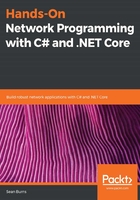
UDP
If the reliability of TCP is not strictly required for an application, then UDP begins to look like a very attractive option for its simplicity and performance. UDP is a simple, unreliable, and connectionless communication protocol for transmitting data over a network. Where TCP provided robust error handling through its pattern of repeated requests and acknowledgments, UDP has no handshaking or acknowledgment signals to indicate whether a packet was properly transmitted from host to host.
While UDP does not provide robust error-handling in the case of lost or unordered packets, it does, at the very least, provide error-checking on the packet level. It does so by using a checksum value stored in the header of the packet. The difference being that when an error is detected in a packet, the packet is simply dropped by the UDP entity, and no request is sent out to try to retrieve the packet again in a valid state.
This packet-delivery-oriented model of sending out individual packets without regard for their successful delivery also means that UDP data requests can be sent without any prior establishment of a connection between hosts. This lack of an initial round-trip greatly reduces overhead in software systems that need to make frequent, real-time connections between many hosts. In fact, this lack of an initial handshake is one of the primary distinguishing factors between connection and connectionless communication protocols, and that is a distinction that warrants elaboration.